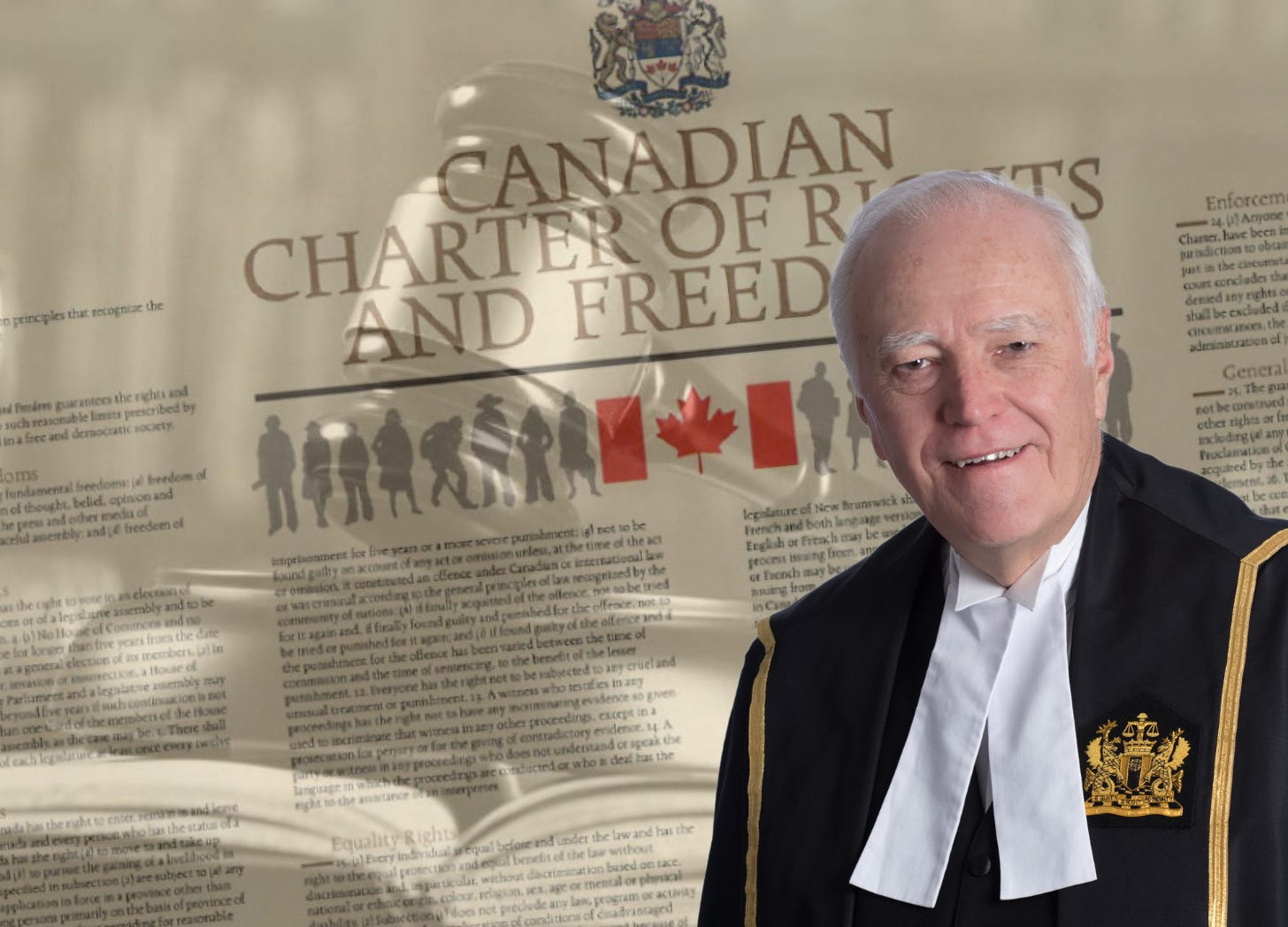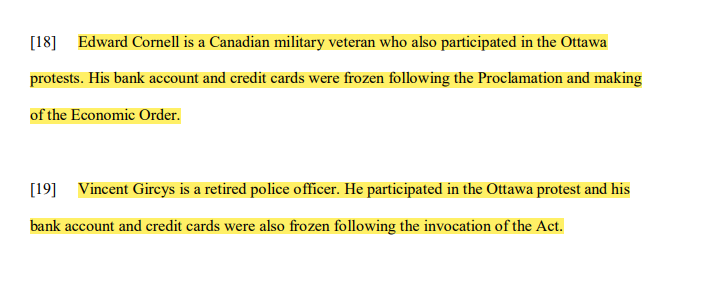A deep dive into the Federal Judge's ruling that found the invocation of the Emergencies Act "unreasonable" and violated the rights of Canadian citizens.
The Canadian Independent examined the recent federal court decision, comprising almost 200 pages of case facts and a separate four-page judgment, to present the most crucial highlights and findings. The case featured numerous applicants, each with distinct outcomes and statements scattered throughout.
Justice Richard G. Mosley was the judge who presided over and ruled on the case. He is a 74-year-old judge appointed by the Liberals and has an extensive background dealing with national security matters.
The case was initiated by various applicants, including Kristen Nagle of Canadian Frontline Nurses , the Canadian Civil Liberties Association (CCLA), the Canadian Constitution Foundation (CCF), and four other individuals: Jeremiah Jost, Edward Cornell, Vincent Gircys, and Harold Ristau. The CCLA and CCF, as human rights organizations, offered support to the individuals in this case by providing legal expertise in the matter.
The court documents reveal that Justice Mosley ruled that the applicants—Kristen Nagle of Canadian Frontline Nurses, Jeremiah Jost, and Harold Ristau—lacked standing to challenge this case, leading to the dismissal of their applications. As per the court documents, their dismissal stemmed from the fact that none of the evidence they submitted supported the assertion that these individuals were personally or directly affected by any of the federal government's Emergencies Act measures.
Concerning the remaining applicants—Edward Cornell, a retired Canadian soldier, Vincent Gircys, a retired OPP officer, the Canadian Civil Liberties Association (CCLA), and the Canadian Constitution Foundation (CCF)—Justice Mosley extended standing to them in the case. This decision hinged on either their personal experiences with the impacts of the Emergencies Act measures or the sound legal arguments they put forth in court.
The respondent in this case, the Attorney General of Canada, sought the dismissal of the entire case on the grounds that most of the applicants lacked standing, and asserted that the case had become "moot."
Contrary to this, Justice Mosley, in his findings, emphasized the "public and national importance" associated with the case. This consideration led him to conclude that there was sufficient reason to proceed with the case.
Mosley ultimately denied the respondent's motion in his judgment, saying, "The respondent's motion for an order striking the application for judicial review is denied, and the court exercises its discretion to determine the matter notwithstanding that it is moot."
Another aspect of this case involves the freezing of bank accounts. As per the court documents, both applicants, Edward Cornell and Vincent Gircy, experienced the freezing of their bank accounts and credit cards.
Justice Mosley additionally highlights that joint account holders, entirely unrelated to the protest, faced frozen bank accounts and credit cards. He notes that the government took no steps to address this issue during the period when the Emergencies Act measures were in effect.
The applicants argued that the seizure of their bank accounts violated Section 8 of the Canadian Charter of Rights and Freedoms, which states that "Everyone has the right to be secure against unreasonable search or seizure."
The respondents (Attorney General of Canada) had argued that the applicant’s bank accounts being frozen was not a "seizure."
Justice Mosley, however, disagreed with the respondents, saying that he had "considerable difficulty with that position" and that "While the purpose of Charter s 8 is to protect privacy rights and not property, governmental action that results in the content of a bank account being unavailable to the owner of the said account would be understood by most members of the public to be a 'seizure' of that account."
Mosley also noted with respect to bank account seizures that he was "satisfied that the disclosure of information about the bank and credit card accounts of the 'designated persons' by the financial institutions to the RCMP constituted a 'seizure' of that information by the government."
Justice Mosley ultimately ruled against the government, and in his judgment, wrote that the federal government violated section 2(b), which states that "Every citizen of Canada and every person who has the status of a permanent resident of Canada has the right to pursue the gaining of a livelihood in any province," and section 8, which again states that "Everyone has the right to be secure against unreasonable search or seizure."
One of the most important elements of this case surrounding the invocation of the Emergencies Act is whether the invocation of the Emergencies Act met the threshold with respect to a "threat to the security of Canada," which is one of the biggest reasons the federal government claimed it had standing to invoke the Emergencies Act. The government claimed that the threat to the security of Canada was due to economic, trade, and commerce impacts caused by the protests.
The applicants in the case argued that the Canadian Security Intelligence Service (CSIS) assessment of the protest did not pose any threats to the security of Canada. According to the CSIS Act, "threats to the security of Canada" include paragraph (c), which states that threats to the security of Canada include "activities within or relating to Canada directed toward or in support of the threat or use of acts of serious violence against persons or property for the purpose of achieving a political, religious, or ideological objective within Canada or a foreign state."
Justice Mosley agreed with the applicants in his facts that the CSIS assessment must carry some weight.
According to Mosley's facts, he found that "the test for declaring a public order emergency under the EA requires that each element be satisfied, including the definition imported from the CSIS Act. The harm being caused to Canada's economy, trade, and commerce was very real and concerning, but it did not constitute threats or the use of serious violence to persons or property," and for that reason, Mosley was "satisfied that the GIC (Government in Council) did not have reasonable grounds to believe that a threat to national security existed within the meaning of the Act."
As part of those facts laid out by Justice Mosley with respect to the invocation of the Emergencies Act being declared because the government claimed it was a national threat to Canada, Justice Mosley ruled that "the decision to issue the Proclamation and the associated Regulations and Order was unreasonable and ultra vires the Emergencies Act." Ultra vires means, in this case, the government acted beyond its legal power or authority.
Mosley applauded the Canadian Civil Liberties Association and the Canadian Constitution Foundation for their efforts in assisting the individual applicants and litigating this case. He points out that if it were not for those two organizations, he may have ruled differently.
Mosley, in his facts, says, "My preliminary view of the reasonableness of the decision may have prevailed following the hearing due to excellent advocacy on the part of counsel for the Attorney General of Canada had I not taken the time to carefully deliberate about the evidence and submissions, particularly those of the CCLA and CCF. Their participation in these proceedings has demonstrated again the value of public interest litigants, especially in presenting informed legal arguments. This case may not have turned out the way it has without their involvement, as the private interest litigants were not as capable of marshaling the evidence and argument in support of their applications."
Canada's Deputy Prime Minister, Chrystia Freeland, announced to reporters on the same day this decision was delivered that her government plans to appeal Justice Mosley's ruling.
The Canadian Independent will continue to monitor this story and bring you any developments.
You can review the 190 page facts of the case at the link below.
You can read the four page ruling at the link below.
https://decisions.fct-cf.gc.ca/fc-cf/decisions/en/524825/1/document.do


















Great Information on a Historic ruling. A victory against the Fascist and Totalitarianism actions of the Liberal Government.
Thank you for the detailed explanations. Well done!